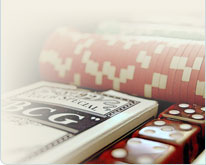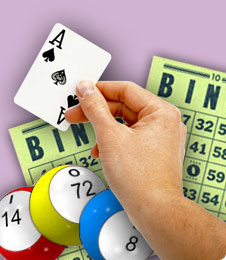 |
 |
 |
| Play Skill Games: |
 |
The ultimate skill game site for those who want to use their skills to beat bingo and online casino games. Play here...
|
Gives you a nice absolutely free bonus of $20 to try free bingo. Play here...
|
A new leader in online poker. Full tables, all options, $750 free bonus and innovative way to play. Play here...
|
An exeptional online casino (just look at the name). Play all casino games, bonuses, perks and more. Play here...
|
 |
|
| Play Skill Games |
 |
|
 |
|
 |
|
 |
|
 |
|
 |
|
 |
|
 |
|
 |
|
 |
|
 |
|
 |
|
|
 |
| Profitable Situations in Poker |
How much would you pay for a program that allowed you to see your opponents' hole cards? Wouldn't it be even better if you had a program that gave your opponents whatever hole cards you wanted them to have? And if you had such a program, you wouldn't just give them all garbage so that you could steal their blinds; you would want to give them second best hands and then value bet them to death. In other words, you would want to create situations where your opponents held slightly worse hands than yours, because these are the most profitable situations in poker.
Well here's the thing: you already have this ability. To some extent, you are in control of the cards that your opponents hold. Whenever an opponent enters the pot, he is doing so with some range of hands that is determined by the action in front of him, his position, his stack size, table conditions, his mood, etc. As the hand progresses, however, you will have the ability to narrow his range depending on the line that you take. Unfortunately, you can't make him throw away the nuts, and in general it will be hard to get him to pitch any of the hands at the top of his range. This is why you should play your big hands fast most of the time: there is little danger of shaking Villain off of a big but slightly worse hand, which means that you are primed to win a large pot. Conversely, playing a medium strength hand too fast is generally bad because it allows Villain to throw away everything you beat and take your money when he's got you beat.
Different games have different types of profitable situations, some more obvious than others. In NLHE, there is set over set, set vs. overpair, set vs. top pair, overpair vs. top pair, etc. In Omaha, there is the nuts with redraws vs. the nuts without redraws. In O/8, there is the nut high vs. two opponents going low, the nut low with a flush draw vs. the nut low, etc. In 5 card stud, there is a concealed pair that allows you to beat the open pair your opponent is showing.
The important thing is that a profitable situation is more than having a good hand; it is having a good hand while your opponent has a slightly less good one that he nevertheless has reason to think is best. Ideally, you would want his hand to be exactly one ranking below yours (i.e. K-high flush when you hold the A-high flush), so that you can apply maximum pressure.
Obviously, there are many other types of profitable situations, such as no deposit casino bonuses and those where you can bluff Villain off of the best hand a large amount of the time, but right now, I'm concerned only with those where you are trying to get maximum value at showdown.
To cash game regulars, a lot of this may seem obvious, because cash game play is all about creating profitable situations. In tournaments, especially at the lowest buy-ins, you can usually study some starting hand guidelines, memorize a push-bot chart, and get by alright, because a lot of your profit will come from players who fail to adapt to tournament-specific bubble or short-stack situations. But there is a lot more money to be made if you know how to get full value out of your hands and not just how to play an unexploitable short stack game.
Fundamentally, good players make money at poker because they know how to recognize and/or create profitable situations. They win the most from second best hands because they know how to keep those hands in the pot and win bets from them.
Creating profitable situations
Whenever I have a made hand (i.e. one that could potentially win unimproved at showdown), I consider my opponents' possible holdings, and then I categorize them into hands I want him to have (because he can/will pay me off), hands I don't want him to have (hands with a lot of outs that won't pay me off unless they catch; hands that are already beating me) and hands that don't matter (those that missed the board completely and are now hopeless; those so good that he will never get away from them, and that I will have to pay off).
The key to making the most of profitable situations is thinking about the hands that are most likely to pay you off and how they will respond to a bet, check, or raise at any given time. In other words, you shouldn't be betting just because you have a decent hand and there is a flush draw on the board. Your move should have a very deliberate purpose: "I am betting because I expect the following hands to call and the following hands to fold." Or, "I am checking because if I bet, Villain will fold the following hands that could pay me off later."
In order to create a profitable situation, you need to take a line that will allow you to win the most from the hands you are beating. If your hand is big enough that it can beat a lot of other hands that Villain may mistakenly think are best (i.e. I have 77 or AJ on an 7JA flop), you can just bet out. If it's checked around to you with A5, I recommend checking it through simply because no reasonable opponent is going to make a mistake against you on that board. Checking behind creates a situation where Villain may take a stab with a worse hand, or may be more inclined to check/call middle pair on the next street, as a bet will look more like a steal.
In the first situation, you hand is already disguised, so you can go ahead and play it fast, because Villain is likely to come along with a hand like top pair. In the second, your hand is slightly worse than the one you are representing by betting the flop. It's not bad enough that you need to bluff, but it is not good enough to bet for value. The only reason to bet (though this is often a sufficient reason) is that the pot is large enough already and/or the board is draw-heavy enough that you want to win it right now, or that you opponent may make the mistake of drawing with bad odds.
There are three key principles at work here:
1. On balance, the more money an opponent puts into the pot, the better his hand is likely to be at that time; however,
2. The larger the pot, the less good an opponent's hand is likely to be at all future decision points.
3. Betting or raising ranges tend to be wider than calling ranges.
In other words, many players will put 3-4 BB's in the pot with a wide variety of reviewed online casinos hands when stacks are deep. Once 12-15 BB's per player go in pre-flop, many people's ranges narrow considerably (though it matters how the money goes in). However, once the flop comes out, a player who would check-fold a whiffed AK in a 12 BB pot might semi-bluff all-in at a 40 BB pot. Certainly, he is more likely to semi-bluff push than to call an all in.
Variance and Profitable Situations
Often, you will have a choice about what kind of profitable situation you would like to create. For instance, on the first hand of a NLHE tournament, you are dealt 99 UTG. You could play this fast, hoping to get value from lower pocket pairs or top pair on a rag board or win it with a continuation bet on the flop against overcards. Or, you could limp in, trying to flop a set and win a big pot against two pair or top pair.
In the former case, you'll win a smaller pot a lot more often, you'll occasionally win a huge pot when you make a set versus top pair, but you'll occasionally lose a large pot against a better pair or get bluffed off of the best hand.

|
| Detailed Reviews of the Top 5 Skill Game Websites |
|
Play slots at slots of vegas casino and see what the best slot machines online looks like. They're available right now for you to play.
|
|
|




.gif)









